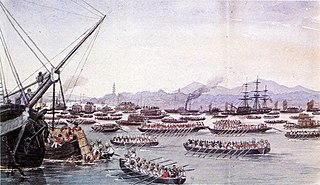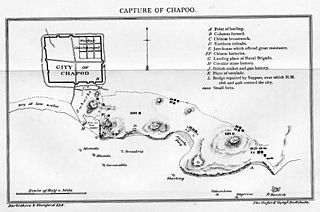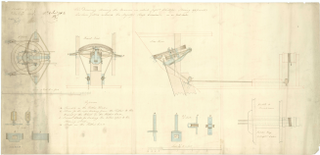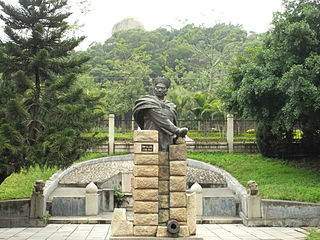
The First Opium War, also known as the Anglo-Chinese War, was a series of military engagements fought between the British Empire and the Qing dynasty of China between 1839 and 1842. The immediate issue was the Chinese enforcement of their ban on the opium trade by seizing private opium stocks from mainly British merchants at Guangzhou and threatening to impose the death penalty for future offenders. Despite the opium ban, the British government supported the merchants' demand for compensation for seized goods, and insisted on the principles of free trade and equal diplomatic recognition with China. Opium was Britain's single most profitable commodity trade of the 19th century. After months of tensions between the two states, the Royal Navy launched an expedition in June 1840, which ultimately defeated the Chinese using technologically superior ships and weapons by August 1842. The British then imposed the Treaty of Nanking, which forced China to increase foreign trade, give compensation, and cede Hong Kong Island to the British. Consequently, the opium trade continued in China. Twentieth-century nationalists considered 1839 the start of a century of humiliation, and many historians consider it the beginning of modern Chinese history.

Field Marshal Hugh Gough, 1st Viscount Gough, was a senior British Army officer. After serving as a junior officer at the seizure of the Cape of Good Hope during the French Revolutionary Wars, Gough commanded the 2nd Battalion of the 87th Regiment of Foot during the Peninsular War. After serving as commander-in-chief of the British forces in China during the First Opium War, he became Commander-in-Chief, India and led the British forces in action against the Marathas defeating them decisively at the conclusion of the Gwalior campaign and then commanded the troops that defeated the Sikhs during both the First Anglo-Sikh War and the Second Anglo-Sikh War.

General Sir Charles John Stanley Gough, was a senior British Indian Army officer and a recipient of the Victoria Cross, the highest award for gallantry in the face of the enemy that can be awarded to British and Commonwealth forces.

The Second Battle of Canton was fought between British and Chinese forces in Canton (Guangzhou), Guangdong province, China, in May 1841 during the First Opium War.

The Siping Campaign (四平战役) was a nine-month struggle between the communist and the Nationalists for Siping in Jilin, China during the Chinese Civil War in the post World War II era, and resulted in communist victory.

William Thornton Bate was a British Royal Navy officer and surveyor. He served in First Anglo-Chinese War and Second Anglo-Chinese War. He died during the Battle of Canton in 1857.

The Second Battle of Chuenpi was fought between British and Chinese forces in the Pearl River Delta, Guangdong province, China, on 7 January 1841 during the First Opium War. The British launched an amphibious attack at the Humen strait (Bogue), capturing the forts on the islands of Chuenpi and Taikoktow. Subsequent negotiations between British Plenipotentiary Charles Elliot and Chinese Imperial Commissioner Qishan resulted in the Convention of Chuenpi on 20 January. As one of the terms of the agreement, Elliot announced the cession of Hong Kong Island to the British Empire, after which the British took formal possession of the island on 26 January.

The Battle of the Bogue was fought between British and Chinese forces in the Pearl River Delta, Guangdong province, China, on 23–26 February 1841 during the First Opium War. The British launched an amphibious attack at the Humen strait (Bogue), capturing the forts on the islands of Anunghoy and North Wangtong. This allowed the fleet to proceed further up the Pearl River towards the city of Canton (Guangzhou), which they captured the following month.

The Battle of First Bar was fought between British and Chinese forces at First Bar Island and its surrounding area in the Pearl River, Guangdong province, China, on 27 February 1841 during the First Opium War.

The Battle of Whampoa was fought between British and Chinese forces at Whampoa Island on the Pearl River near the city of Canton (Guangzhou), Guangdong, China, on 2 March 1841 during the First Opium War.

The Battle of Ningpo was an unsuccessful Chinese attempt to recapture the British-occupied city of Ningbo (Ningpo) during the First Opium War. British forces had bloodlessly captured the city after their victory at Chinhai, and a Chinese force under the command of Prince Yijing was sent to recapture the city but was repulsed, suffering heavy casualties. The British eventually withdrew from the city the following spring.

The Battle of Tzeki, Cixi, or Tsz'kí was fought between British and Chinese forces in Tzeki (Cixi), Zhejiang province, China on 15 March 1842 during the First Opium War.

The Battle of Wusong (Woosung) (Chinese: 吳淞戰役) was fought between British and Chinese forces at the entrance of the Wusong River (present-day Huangpu River), Jiangsu province, China, on June 16, 1842, during the First Opium War. The British capture of the towns of Woosung (now Wusong) and Baoshan opened the way to Shanghai, which was captured with little resistance on June 19.

The Battle of Chinkiang was fought between British and Chinese forces in Zhenjiang (Chinkiang), Jiangsu province, China, on 21 July 1842 during the First Opium War. It was the last major battle of the war. The Chinese force consisted of a garrison of Manchu and Mongol Bannermen. In command of the British forces was Sir Hugh Gough. Leading one brigade was future British field marshal Sir Colin Campbell. The British capture of this stronghold allowed them to proceed to Nanjing. Fought near the confluence of the Grand Canal and Yangtze River, the battle effectively blocked operation of the Caoyun system, a transport network vital for the movement of grain throughout the empire. As a result, the Daoguang Emperor decided to sue for peace and agreed to sign the Treaty of Nanking, which brought hostilities to an end. Mass suicide was committed by the Manchu Bannermen who were defending the city.

Zhapu, alternately romanized as Chapoo or Chapu, is a town under the administration of Pinghu, in the north of Zhejiang Province, China. It is located along the northern shore of Hangzhou Bay in the southeastern part of Pinghu and borders Haiyan County to its south and southeast. The town covers an area of 54.4 square kilometers and has a population of 54,000.

Lieutenant General Sir James Holmes Schoedde KCB was a British Army officer who became colonel of the 2nd Regiment of Foot and the 55th Regiment of Foot.

HMS Cruizer was a Snake-class ship-sloop launched in 1828 for the British Royal Navy. The ship was built as a revival of the retired Snake-class ship-sloops. The Navy converted her to a brig in 1831, back to a ship in 1840, and sold her at Bombay in 1849.

Nicholas Ralph Tomlinson (1803–1842) was a British Army infantry officer who commanded Her Majesty's 18th Regiment of Foot during the First Anglo-Chinese War. He was the second son of Vice Admiral Nicholas Tomlinson and his wife Elizabeth who lived in the county of Essex.

Chen Huancheng was a 19th-century military leader of Qing China. He served as the provincial military leader in Jiangnan Province before being killed in the First Opium War.

The battle of Baddowal was an engagement between the Sikh Khalsa Army and British forces which occurred on 21 January 1846 during the First Anglo-Sikh war. After the Khalsa Army was defeated at the battles of Mudki and Ferozeshah, Ranjodh Singh Majithia led a large Sikh army to attack the British cantonment at Ludhiana. Harry Smith led a column of troops to intercept them, and both armies met at Baddowal but did not engage. Smith's column marched to Ludhiana having suffered several casualties from Sikh artillery and cavalry attacks.























